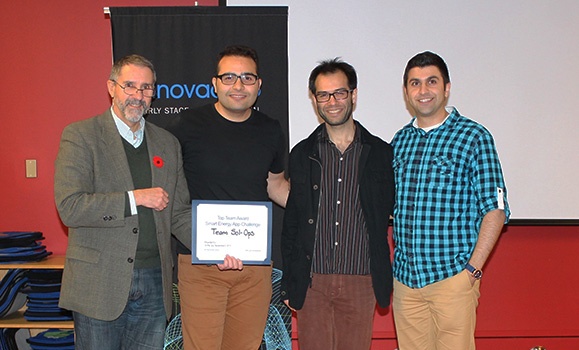Innovacorp and ShiftKey Labs ‚Äî¬Ýthe Dal-hosted information and communications technology sandbox ‚Äî set the stage for the first-ever Halifax this fall.
Kicking off with a ‚ÄúHackathon‚Äù event in late September, 40 participants across 10 teams were challenged to develop a new app to benefit participants in Halifax‚Äôs Solar City program, which offers homeowners and businesses in Halifax with solar energy options. ¬Ý
With data from the program at the ready ‚Äî collected from 20 sensors from installed thermal systems that measure temperature, flow rate and solar flux ‚Äî¬Ýthe teams had to find a way to use this data to add value for customers using the solar-powered hot water installations.
Last month, the results were announced, and the successful teams featured several Dal students. The champion: Sol-Ops, created by Pedram Abidi (Research Associate, Institute for Big Data Analytics), Parsa Sarshar (Master of Computer Science student), and alumnus Mehran Zamani. The app optimizes the economical and environmental usage of solar hot water systems by understanding the user’s behaviour patterns and showing them what behaviours should be continued or changed, in order to reduce their hot water system’s energy consumption. The team received a $6,500 prize.
Two teams tied for runner-up. The first was PayRays created by student Sam Jawich (Bachelor of Informatics student), with alumni Eric Noel and Majd Hussini. The second HFX Smart Solar with team members including PhD students Anh Dang and Shadi Shehadeh with alumni Abidalrahman Moh'd, and Hatem Nassrat.
Providing opportunities
The goal of the competition was to support emerging IT talent in identifying opportunities in the energy sector.
“We’ve been seeing a tremendous amount of talent and drive in our local IT start-up community, but unlike other jurisdictions, we weren’t seeing those skills and energy directed towards smart energy innovation,” said Stephen Duff, Innovacorp’s president and CEO. “We wanted to create an opportunity where we could nudge the existing skills towards this burgeoning sector.”
Hence: the hackathon, an event where computer programming, business, and design students get together to develop new software ideas. Many groups across campus are working hard to encourage students to adopt a more entrepreneurial mindset, and hackathons help in this quest.
“Hackathons are important events for universities as they are a great vehicle to drive innovation,” says Grant Wells, program manager at ShiftKey Labs. “They bring together people with diverse backgrounds to tackle a challenge in a very short period of time.”
Beyond hackathons, offers students a broad mix of resources, supports, and opportunities for individuals wishing to experiment with and develop start-up ideas containing a technical component. They provide free, physical space to collaborate on ideas within your own team and learn from other lab residents. (Learn more: shiftkeylabs.ca)
While working through their degrees, students now have many opportunities to attend activities like this on campus that teach them how to innovate quickly — and the hope is that the groundwork will be laid for developing future ideas.
‚ÄúWhen organizing a hackathon, of course you always worry about things like will people come, and if they do, will they just come for the prizes, for the free pizza, for the good times,‚Äù says Duff.¬Ý ‚ÄúWe were delighted with what we saw that weekend and in the weeks since ‚Äî real innovations with real problem-solving and market potential.‚Äù
Teams of the Smart App Challenge were judged on their ability to clearly communicate their idea, if their idea had the potential to change user behaviour or make an impact on resource use, ease of user experience and app functionality.
Potential through partnership
For ShiftKey Labs and Dalhousie, the opportunity to team with on the challenge was a welcome one. The organization works to find, fund, and foster innovative Nova Scotia start-ups and provides entrepreneurs with access to incubation facilities, expert advice and other support to help accelerate into companies.
“Ultimately, here at ShiftKey Labs, we would like to help students start off on the right track by providing free, physical collaboration space to test out ideas and provide the right supports to learn at a very early stage whether their idea will solve a worthwhile ‘pain point’ that customers are eventually willing to pay for,” says Wells.
“Students should feel prepared to advance their idea to the next phase of incubation or acceleration and know what resources — like Innovacorp — are available to them in the region.”

